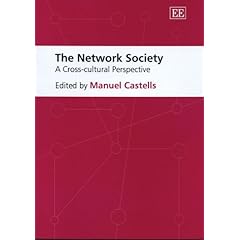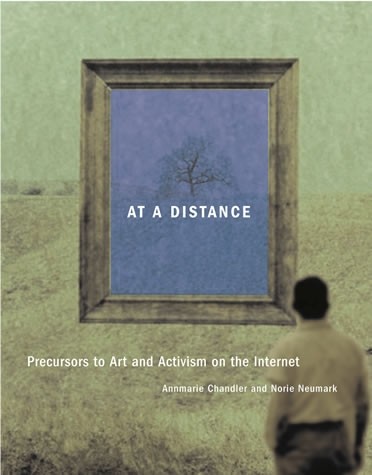Manuel Castells (ed.): The Network Society: A Cross-cultural Perspective (2005)
Filed under book | Tags: · digital divide, e-learning, internet, network culture, network society, social movements

Manuel Castells – one of the world’s pre-eminent social scientists – has drawn together a stellar group of contributors to explore the patterns and dynamics of the network society in its cultural and institutional diversity. The book analyzes the technological, cultural and institutional transformation of societies around the world in terms of the critical role of electronic communication networks in business, everyday life, public services, social interaction and politics. The contributors demonstrate that the network society is the new form of social organization in the Information age, replacing the Industrial society. The book analyzes processes of technological transformation in interaction with social culture in different cultural and institutional contexts: the United States of America, the United Kingdom, Finland, Russia, China, India, Canada, and Catalonia. The topics examined include business productivity, global financial markets, cultural identity, the uses of the Internet in education and health, the anti-globalization movement, political processes, media and identity, and public policies to guide technological development. Taken together these studies show that the network society adopts very different forms, depending on the cultural and institutional environments in which it evolves.
Published by Edward Elgar, 2005
ISBN 1843765055, 9781843765059
464 pages
More info (wikipedia)
More info (google books)
Annmarie Chandler, Norie Neumark (eds.): At a Distance: Precursors to Art and Activism on the Internet (2005)
Filed under book | Tags: · 1970s, 1980s, activism, art history, experimental art, fluxus, mail art, media art, network art, network culture, networks, new media, radio art, telematics

“Networked collaborations of artists did not begin on the Internet. In this multidisciplinary look at the practice of art that takes place across a distance—geographical, temporal, or emotional—theorists and practitioners examine the ways that art, activism, and media fundamentally reconfigured each other in experimental networked projects of the 1970s and 1980s. By providing a context for this work—showing that it was shaped by varying mixes of social relations, cultural strategies, and political and aesthetic concerns—At a Distance effectively refutes the widely accepted idea that networked art is technologically determined. Doing so, it provides the historical grounding needed for a more complete understanding of today’s practices of Internet art and activism and suggests the possibilities inherent in networked practice.
At a Distance traces the history and theory of such experimental art projects as Mail Art, sound and radio art, telematic art, assemblings, and Fluxus. Although the projects differed, a conceptual questioning of the “art object,” combined with a political undermining of dominant art institutional practices, animated most distance art. After a section that sets this work in historical and critical perspective, the book presents artists and others involved in this art ‘re-viewing’ their work—including experiments in ‘mini-FM’, telerobotics, networked psychoanalysis, and interactive book construction. Finally, the book recasts the history of networks from the perspectives of politics, aesthetics, economics, and cross-cultural analysis.”
Publisher MIT Press, 2005
ISBN 0262033283, 9780262033282
xiv+486 pages
Reviews: Publishers Weekly (2005), Vincent Bonin (2005), Graham Meikle (Scan, 2006), Paolo Gerbaudo (Culture Machine, 2006), Joel Slayton (Art Book, 2006), Karrie Karahalios (New Media & Society, 2006), Jennifer Way (RCCS, 2008, with responses from editors).
PDF (updated on 2019-11-22)
Comments (3)Harold Abelson, Ken Ledeen, Harry Lewis: Blown to Bits: Your Life, Liberty, and Happiness After the Digital Explosion (2008)
Filed under book | Tags: · control society, privacy, surveillance, web 2.0
“Wherever you go…whatever you say, write, photograph, or buy…whatever prescriptions you take, or ATM withdrawals you make…you are generating information. That information can be captured, digitized, retrieved, and copied –anywhere on Earth, instantly. Sophisticated computers can increasingly uncover meaning in those digital traces–understanding, anticipating, and influencingyou as never before.
Is this utopia? Or the dawning of a 1984/Brave New World horror world? Whatever you call it, it’s happening. What kind of world are we creating? What will it be like to live there? Blown to Bits offers powerful and controversial answers to these questions–and give you the knowledge you need to help shape your own digital future, not let others do it for you. Building on their pioneering joint MIT/Harvard course, the authors reveal how the digital revolution is changing everything, in ways that are stunning even the most informed experts.
You’ll discover ten paradoxical truths about digital data–and learn how those truths are overturning centuries-old assumptions about privacy, identity, and personal control.
You’ll view the indelible digital footprints you’re making when you search Google…send emails and text messages…write Microsoft Word documents…download MP3s…make cellphone calls…post blog entries…pay highway tolls…use your supermarket discount card. And you’ll see how others could be following those footprints, in ways you never thought about, and might not like.
Writing in plain English, the authors illuminate the myriad implications of the digital revolution, answering the questions you’ve wondered about–or ought to wonder about. Who owns all that data about you? What do they owe you? How private is your medical information? Is it possible to send a truly secure message? Who can you trust for accurate information when traditional media is replaced by thousands of unfiltered Internet sources?
Along the way, they reveal the decisions governments and corporations are making right now that will shape your future…and show how to have your say in those decisions. Because you have an enormous stake in the outcome. We all do.”
Publisher Addison-Wesley, 2008
Creative Commons Attribution-Noncommercial-Share Alike 3.0 United States License
ISBN 0137135599, 9780137135592
366 pages
Book website
Interview (Democracy Now!, 2009)

